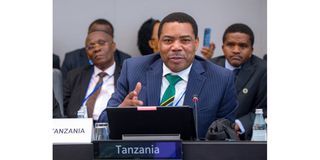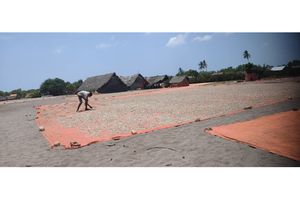Tanzania's Finance Minister calls for African-led investment in Africa

Finance Minister Dr Mwigulu Lameck Nchemba during the Spring Meetings of the International Monetary Fund (IMF) for the Africa Group I Constituency
What you need to know:
- The Minister called for deliberate investment in critical sectors such as infrastructure and local manufacturing — especially pharmaceutical industries — which would not only expand employment opportunities but also strengthen domestic economies.
Washington. Finance Minister Dr Mwigulu Lameck Nchemba has urged African countries to embrace strategic intra-continental investment and trade as a means to navigate the shifting tides of global economic policies.
Speaking in Washington D.C., United States, during the Spring Meetings of the International Monetary Fund (IMF) for the Africa Group I Constituency, Finance Minister Dr Nchemba made the case for a united African economic front. He was contributing to the Annual Report on the IMF’s implementation agenda.
Dr Nchemba highlighted that the emerging wave of protectionist policies — including heightened tariffs and trade barriers imposed by major global economies — should serve as a catalyst for African countries to reinforce economic resilience through internal collaboration and trade.
He noted that instead of positioning themselves as rivals, African nations must become economic allies. Failure to do so, he warned, could jeopardise the long-term economic prospects of the continent.
The Minister called for deliberate investment in critical sectors such as infrastructure and local manufacturing — especially pharmaceutical industries — which would not only expand employment opportunities but also strengthen domestic economies.
He further expressed concern over the shrinking availability of international financing, driven by rising interest rates in advanced economies and a retreat from aid and concessional lending.
This trend, he said, has tightened fiscal space across many African countries, impeding development progress.
As a result, Dr Nchemba explained, macroeconomic instability has deepened, institutional capacity has weakened, and access to affordable and market-based financing has become increasingly constrained, thereby hampering the realisation of development goals.
Chairing the session, Central Bank of Botswana Governor Cornelius Dekop echoed Dr Nchemba’s sentiments. He emphasised that African countries must intensify local processing of goods and enhance trade cooperation within the continent, rather than over-relying on external markets.
Mr Dekop reiterated that the prevailing global trade challenges present an opportunity for Africa to harness its internal markets and vast investment potential, shifting from dependency to self-driven development.



